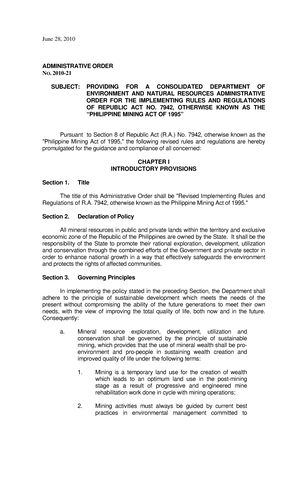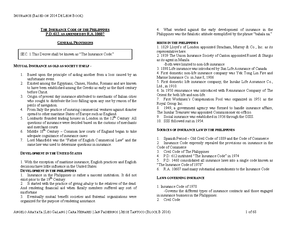- Information
- AI Chat
Was this document helpful?
Illegal Gambling Report 01
Course: Juris Doctor
999+ Documents
Students shared 3474 documents in this course
University: University of Cagayan Valley
Was this document helpful?

What is Gambling?
Gambling is any game or scheme, whether upon chance or skill, wherein wagers are
made consisting of money, articles or value or representative of value being put at stake.
It is the act of wagering or betting money or something of value on an event with an
uncertain outcome with the intent to win more money or things of value than was wagered.
It is simply risking something of value, including money, for the chance of winning more
than you risked.
Gambling in the Philippines is not illegal when it is licensed and regulated for the purpose
of revenue generation for governmental national development programs such as casinos
regulated by Philippine Amusement And Gaming Corporation (PAGCOR) or those engaging in
welfare-related health investments such as lottery games organized and regulated by Philippine
Charity Sweepstakes Office (PCSO) or Cockfighting for Entertainment of Tourists or for
Charitable Purposes.
What is illegal gambling?
Illegal gambling is committed by any person who, in any manner, shall directly or
indirectly take part in any illegal or unauthorized activities or games of –
(1) cockfighting, jueteng, jai alai or horse racing to include bookie operations and game
fixing, numbers, bingo and other forms of lotteries;
(2) cara y cruz, pompiang and the like;
(3) 7-11 and any game using dice;
(4) Black jack, lucky nine, poker and its derivatives, monte, baccarat, cuajao, pangguingue
and other card games;
(5) paik que, high and low, mahjong, domino and other games using plastic tiles and the
likes;
(6) slot machines, roulette, pinball and other mechanical contraptions and devices;
(7) dog racing, boat racing, car racing and other forms of races;
(8) basketball, boxing, volleyball, bowling, pingpong and other forms of individual or team
contests to include game fixing, point shaving and other machinations;
(9) banking or percentage game, or
(10) any other game scheme, whether upon chance or skill, wherein wagers
consisting of money, articles of value or representative of value are at stake
or made.
P.D. No. 449 (Cockfighting Law of 1974) vs P.D. 1602 vs R.A. 9287
PD 449 or the Cockfighting Law of 1974 specifically governs the establishment,
operation, maintenance and ownership of cockpits; PD 1602 prescribes stiffer penalties on all
types of illegal gambling enumerated by law to make them more effective in combating the social
menace which dissipate the energy and resources of the Filipino people; R.A. 9287 increased
the penalties for illegal numbers games and amends certain provisions of PD 1602 as a more
stringent measure to stop and eradicate the existence of illegal numbers games in any part of the
country.
As to PUNISHABLE ACTS:
PD 449 or Cockfighting Law of 1974 – (1) direct or indirect participation in cockfights,
by betting money or other valuable things, or organizing cockfights at which bets are made,
on a day other than those permitted by law or (2) at a place other than a licensed cockpit.
(d) Holding of Cockfights. Except as provided in this Decree, cockfighting shall be allowed only in
licensed cockpits:
during Sundays and legal holidays and during local fiestas for not more than three
days.











